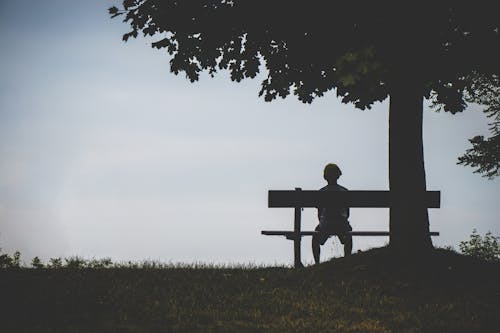
Loneliness, a common emotion among humans, may result in a negative impact on our mental health. We must understand the devastating effects of loneliness and arm ourselves with effective ways to cope. This article goes into the subject, analysing the specifics of loneliness while giving helpful tips for managing its challenges.
What are Loneliness and Social isolation?
Loneliness and social isolation are two concepts that are connected yet unique in that they both involve a sense of feeling excluded from others.
The feeling of being alone is the emotional state that leaves one detached and separated, even when surrounded by people. It is a mental condition with a lack of important relationships with others, which can result in feelings of sadness, feeling empty, and being alone.
Social isolation, on the other hand, is a desired state of having little or no social contact with others. It can be caused by a variety of conditions, including physical distance, a lack of social networks, or situations that limit social connections.
While social isolation can be measured, loneliness is an emotional feeling that may arise even when there is no physical isolation.
Loneliness and social isolation can have serious consequences for people’s mental, emotional, and physical health. Those who experience extended loneliness or social isolation may be more likely to develop mental health concerns such as depression, anxiety, and increased stress levels.
These diseases can also affect thinking abilities, sleep patterns, and overall quality of life. Loneliness and social isolation can also result in a weakened immune system, higher blood pressure, and higher levels of inflammation, all of which can have a bad impact on physical health.
Persons may also feel a decline in social skills, lower self-esteem, and a loss of sense of purpose and identity. Understanding the negative impacts of loneliness and social isolation is essential for building positive environments, developing social connections, and putting mental and physical well-being first.
Common causes of loneliness
Consequences for Mental Health
Loneliness and social isolation can hurt mental health. Long periods of feeling lonely or detached from people might increase the chance of developing mental health problems such as depression, anxiety, and stress.
Individuals who lack social support and meaningful connections may feel alone, empty, and emotionally drained.
Cognitive Degeneration and Impairment
According to research, ongoing isolation from other people may be linked to a decrease in mental abilities. Memory retention, focus, and problem-solving ability can all suffer from a lack of stable social connection and stimulation of thought.
maintaining mental wellness requires engagement with social activities and maintaining connections with others.
Implications for Physical Health
Physical health may be impacted because of the result of loneliness and social isolation. People who feel lonely for a long duration of time may be at a higher risk of getting different health disorders, such as cardiovascular disease, high blood pressure, reduced immune system function, and even death.
Social contact and support play an essential role in improving physical well-being and maintaining a healthy lifestyle.
Related: The Dark Side of Food Processing: 5 Stealthy Health Risks Exposed
Emotional Well-Being Issues
Feeling lonely and socially isolated can lead to emotional difficulties. People may feel empty, have poor self-esteem, and have a lowered feeling of self-worth.
A lack of significant social relationships and support systems can contribute to feelings of unhappiness, irritation, and discontent with life in general.
Relationships and Social Skills
The influence of loneliness and social isolation on social skills and relationships is one of the less well-known consequences. Individuals may struggle to build and maintain connections if they do not engage in frequent social interactions.
Social anxiety may develop, making connecting with others and participating in social situations more difficult.
Overall Life Quality
Loneliness and social isolation hurt an individual’s overall quality of life. A lack of social support, meaningful relationships, and a sense of belonging can result in a lower sense of pleasure, fulfilment, and life satisfaction.
It can stifle personal development, obstruct chances for personal and professional development, and contribute to a general sense of discontent.
Categories of loneliness
Being alone is a difficult and multifaceted feeling that can present itself in several ways. Recognising all kinds of being alone can help us identify and solve the particular problems someone might face. Let us look at the many types of social disconnection:
Emotional Isolation
Emotional isolation is described as a lack of deep and significant emotional relationships with people. It happens when people want personal relationships, such as close friendships but are unable to form or maintain them.
People who are lonely emotionally typically need friendship, understanding, and the chance to communicate their thoughts and feelings with someone who genuinely understands and connects with them.
Social Isolation
The absence or limited engagement in social activities and connections can be described as social loneliness, which is also known as social isolation. It happens when people have limited contact with their friends, or community groups.
They may feel disconnected, separated, and socially isolated, missing the sense of belonging that comes from sharing experiences with others. Social isolation can lead to feelings of estrangement and is especially difficult for people who just moved or suffered a big life change.
Loneliness in Existence
Existential loneliness can be defined as a more fundamental feeling of separation and isolation from one’s own identity and purpose in life. It is marked by feelings of deep emptiness, disconnection, and a loss of meaning or importance.
People suffering from existential loneliness may doubt the meaning of their life, struggle with identity, and experience severe loneliness even while surrounded by others. This type of loneliness is frequently caused by a strong need for existential connection and understanding.
Collective Isolation
Individuals experience collective loneliness when they feel separated from their larger communities, societal groups, or cultural identities. It comes from a feeling of not belonging to or being understood by society as an entire group.
This type of loneliness can be caused by societal causes such as discrimination, exclusion, or feeling isolated from one’s community’s ideals and standards.
The necessity of creating open and varied societies that accept and welcome individual differences is made clear by collective loneliness.
How Social Isolation differ from loneliness
Social isolation and loneliness are special circumstances with different impacts on our well-being. The ideal situation of having limited social contact or few connections with others, often caused by situations such as geographical separation or mobility limits, is known as social isolation.
Loneliness, on the other hand, is a personal emotional condition which happens when there is an apparent difference between wanted and real social ties. Even when surrounded by others, it is a strongly felt feeling of isolation.
While social isolation can exacerbate emotions of feeling alone it is essential to remember that not all socially isolated people are lonely, and not all lonely people are socially isolated.
Understanding such features may help in the development of therapies targeted at improving social ties and treating the root causes of loneliness.
We can fight social isolation and loneliness by establishing meaningful relationships and providing chances for social engagement, resulting in a more supportive and connected community.
Common Causes of Social Isolation
Different factors may result in people feeling isolated and lacking real social relationships, which can lead to social isolation. Let’s look at some of the most prevalent reasons for social isolation:
Geographical Considerations
Living in isolated or rural places, for example, might lead to social isolation. It may be difficult to establish and maintain social relationships when you have limited access to social events, neighbourhood assets, and a smaller population density.
Transitions in Life
Retirement, migration, or the death of a loved one can all disrupt social networks and lead to social isolation. These huge life transitions can lead to a decreasing social circle, leaving people feeling isolated and unable to restore their social relationships.
Problems with physical or mental health
Physiological or behavioural issues may have an enormous impact on people’s ability to engage in social activities and maintain connections. Physical sickness, difficulties with mobility, or mental health problems can all limit social engagement and add to feelings of isolation.
Language or cultural differences
Communication or differences, in culture can make it difficult to form connections with others, especially for those who are new to a town or come from different cultures. Communication difficulties or the feeling of being an outsider can lead to social isolation and a sense of not belonging.
Social and Economic Factors
Poverty or limited availability of resources, for example, might lead to social isolation. Financial restrictions may limit social involvement options, making it harder to engage in social activities or access support networks.
Factors Related to Age
Due to causes such as the loss of friends and family members, retirement, or reduced mobility, older persons may experience social isolation. Changes in age and decreased social connections might increase the likelihood of isolation in this population.
societal isolation can result from societal stigma or discrimination based on variables such as race, gender, or handicap. Feeling marginalised or excluded might deter people from pursuing social ties, leading to feelings of loneliness.
Impact of Loneliness on mental health
Being alone may have an important effect on our mental health, which affect a lot of our mental and emotional health. Let’s look at how loneliness affects mental health:
Increased Depression and Anxiety Risk
The loneliness that lasts has been strongly related to a higher possibility of getting depression and anxiety disorders. Sadness, hopelessness, and higher levels of stress are all made worse by feelings of social isolation and a lack of meaningful relationships.
These unpleasant feelings can have a long-term impact on mental health and contribute to the development of mental health problems.
Cognitive Function Impairment
Loneliness may damage mental abilities such as memory, concentration, and decision-making. Memory loss and difficulty in thinking clearly might result from a lack of social engagement and participation. Being alone can have an effect on focus, problem-solving ability, and general mental performance.
Low self-esteem and self-confidence
Lonely people often have trouble with poor self-esteem and lack of confidence. Feelings of worthlessness and self-doubt can be worsened by a lack of supporting connections and meaningful social contacts. This might result in poor self-perception and a low feeling of self-worth.
Stress and inflammation have increased
Feeling alone can lead to higher stress and chronic inflammation in the body. The feeling of stress created by loneliness can be harmful to both physical and mental health.
Long-lasting inflammation, which is often linked with feeling alone has been related to the development of a variety of health disorders, including cardiovascular disease and some mental diseases.
Sleep Disorders
Being alone may disrupt sleep habits and cause sleep disorders. Emotional sadness and feelings of isolation can make it difficult to fall asleep, remain asleep, or have peaceful sleep. Lack of sleep can worsen mental health problems by affecting mood, ability to think, and general well-being.
Increased Substance Abuse Risk
Being alone has been linked to an increased risk of substance addiction because people sometimes turn to substance abuse as a way to cope. Substance addiction may worsen mental health issues and create an endless loop of bad feelings and dependence.
Social isolation, or a lack of meaningful social relationships and interactions, can have serious consequences for our mental health.
It can result in an increased risk of sadness and anxiety, feelings of being alone or isolated, memory loss, an increased risk of mental health conditions, poor emotional well-being, a weaker immune system, and even an increased chance of death.
Those who are socially isolated may have lower mental health outcomes, such as increased emotional discomfort and memory loss. Understanding these consequences is essential for creating therapies to fight the negative effects of social isolation on mental health.
Promoting connections with others, being involved in the community, and seeking help from loved ones and experts can all help to reduce the negative impacts of social isolation on mental health.
Coping Strategies for Dealing with Loneliness and Social Isolation
1. Recognise Your Emotions
Recognise and accept your emotions of social isolation and being alone. Understand that these feelings are genuine and natural. Consider what causes these feelings and how they affect your mental health. Understanding your emotions allows you to begin to create healthy coping skills.
2. Creating Healthy Support Networks
Contact friends, family members, or support groups for a sense of belonging and connection. Develop friendships with people who understand and support you.
Participate in activities or join groups where you may meet like-minded people and form new friendships. Building strong support networks can help to relieve isolation and provide essential social connections.
3. Concentrating on the Positive
Look at the good things about your life. Identify the things you appreciate and enjoy to practise gratitude. Take part in things that make you happy, such as hobbies, exercise, or artistic activities.
You may increase your general well-being and decrease the impact of loneliness by refocusing your attention on pleasant events.
4. Decreased Stress Levels
Loneliness and social isolation can raise stress levels, affecting mental health. Explore stress-reduction approaches such as mindfulness, meditation, deep breathing exercises, and calming activities.
Make self-care a priority and develop healthy habits that include exercise, proper sleep, and nutritious food. Stress management can boost resilience and help overcome the negative impacts of loneliness.
5. Seeking Professional Help
Seeking professional therapy may prove useful if feelings of isolation from other people continue and have an important impact on your daily life.
Therapists and counsellors, for example, can give information, support, and solutions based on research to help you manage these issues. They may assist you with exploring underlying difficulties, developing coping skills, and providing a safe environment to express your emotions.
Conclusion
Finally, loneliness and social isolation may have a negative influence on our mental health. Understanding what this means and putting coping techniques in place are essential steps towards improving one’s well-being.
We may manage the problems of being alone and socially isolated more successfully by identifying and understanding our feelings, developing healthy support systems, concentrating on the positive aspects of life, minimising stress levels, and getting professional help when necessary.
Remember that everyone’s path is different, so be gentle with yourself and allow yourself the time and space to recover. Seek help from loved ones and experts, and remember that you are not alone in this.
We can work together to create a society that promotes connection, belonging, and total mental well-being for all.

